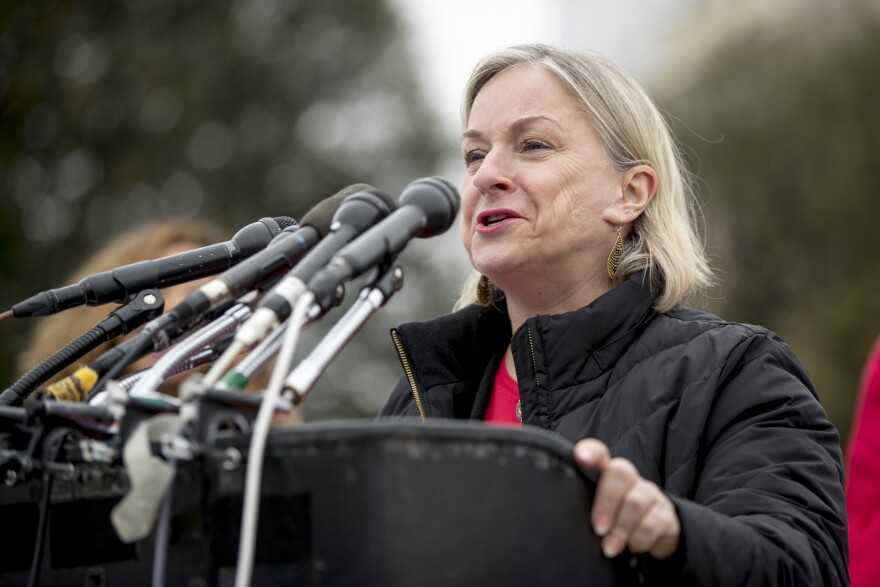- The U.S. House of Representatives is scheduled to vote on a continuing resolution Tuesday afternoon that would fund the federal government into January
- U.S. Rep. Susan Wild said she's optimistic it will pass because lawmakers don't want to be in Washington, D.C., for Thanksgiving
- Wide divisions remain in the House over how to fund the government long-term
BETHLEHEM, Pa. — U.S. Rep. Susan Wild, D-Lehigh Valley, expressed some optimism Tuesday that the House of Representatives will find a way to avoid a federal shutdown as Friday's funding deadline looms.
The House is expected to vote on a continuing resolution, or CR, at 4:30 p.m. Tuesday that would fund the federal government through the holidays.
Because of procedural failures, the temporary funding will need two-thirds of representatives to back it, making bipartisan support necessary.
Despite the higher hurdle, Wild said she thinks it will have enough support to avert a shutdown.
While political divisions still wrack the halls of Congress, members are unified in their desire to be out of Washington next week, she said.
"I suspect a lot of the motivation here is to get the funding done before the Thanksgiving holiday."U.S. Rep. Susan Wild, D-Lehigh Valley
"I suspect a lot of the motivation here is to get the funding done before the Thanksgiving holiday," Wild said.
If the bill does pass, it would be among the few things on which House members have agreed this year.
Even choosing a speaker has proven challenging. Rep. Kevin McCarthy, R-Calif., held the post for nine months before he was ousted by members of his own party in October after he partnered with Democrats to pass a 45-day CR.
The Republican majority took three weeks before it rallied around Rep. Mike Johnson, R-La., leaving his leadership team with little time to find a funding solution.
Two funding deadlines
Right now, Johnson's plan is to pass a CR this week that would set two funding deadlines.
Some federal departments, such as transportation, housing and urban development and agriculture would run out of money by Jan. 12. The remaining agencies and departments would need to be funded Feb. 2.
Johnson has described the two-step approach as a ladder plan, and it's never been tried before. But it's a new strategy as Republicans try unify their narrow majority.
The conservative holdouts that pushed McCarthy out have insisted on broad spending cuts that are unlikely to pass the Democrat-controlled Senate and White House.
Republicans have avoided negotiating with Democrats that likely would produce more moderate bills, leaving the House deadlocked.
Congress frequently relies on CRs to keep the government functioning. Members haven't passed all their needed appropriation bills by their Oct. 1 deadline since 1997. This would be the fourth CR of 2023; the record is 21 in 2001.
Even if Congress passes a CR, it's not clear how the House, the Senate and the White House can bridge their differences in early 2024.
While President Joe Biden and McCarthy hammered out the terms of a funding agreement in May, Republican hardliners have demanded steep cuts that go beyond those levels.
Rep. Wild's approaches
Republicans have struggled to pass their own appropriation bills out of the House; two such bills were pulled at the last minute in recent days.
On Tuesday morning, Wild lobbied against Republicans' proposed appropriations bill for Labor, Health and Human Services, Education and Related Agencies.
Among larger cuts, it would eliminate a $948-million youth job training apprenticeship program and cut $173 million for an adult job training program.
Those programs are investments in the American economy and help communities build the workforces their communities need to compete, Wild said.
In the Lehigh Valley, $239,629 was awarded last year to Suburban EMS to create an accelerated eight-week emergency medical technician training program.
Wild has proposed legislation that would create similar funding to address the shortage of early childhood educators.
"These apprenticeship programs literally pay dividends for the American economy," she said.


